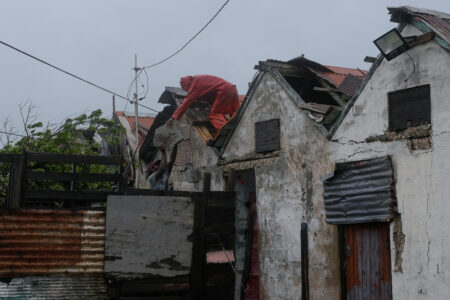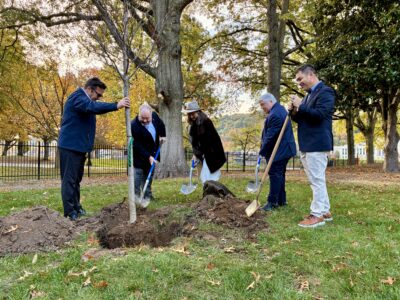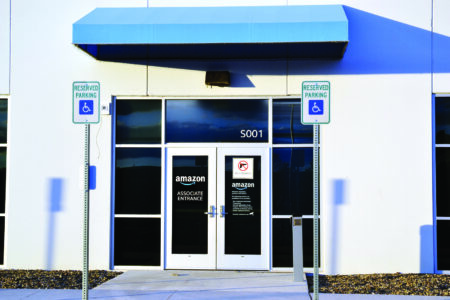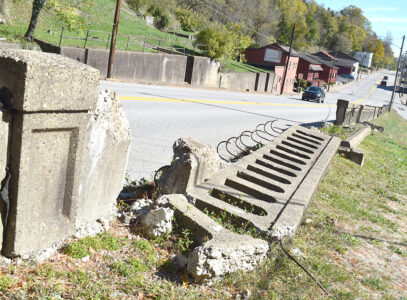Morrisey Seeks Match for Food Bank Funding in West Virginia
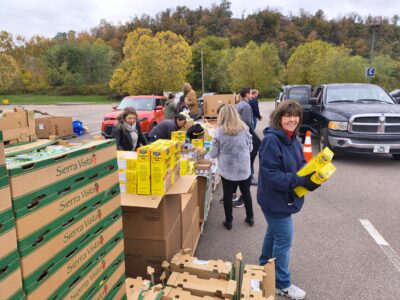
photo by: Shelley Hanson
Volunteers distribute Mountaineer Food Bank items to people in need on Wheeling Island Thursday.
CHARLESTON — West Virginia is prepared to spend up to an additional $13 million supporting the state’s two largest food banks as SNAP benefits run out at the beginning of November due to the ongoing federal government shutdown, but Gov. Patrick Morrisey is seeking private matching donations.
Speaking during a press conference Tuesday at the State Capitol, Morrisey said the state has up to $13 million in contingency funding left over from the COVID-19 pandemic it was willing to distribute evenly between Mountaineer Food Bank and Facing Hunger Foodbank beginning as soon as today.
“Now we know that the next challenge is going to be securing and distributing the food to those who need it,” Morrisey said. “West Virginians in the past have shown that they come together during times like this. We take care of our neighbors, we roll up our sleeves, we get things done. So today, I’m calling on all of us across West Virginia … who care about the needy in our state to step up.”
The West Virginia Department of Human Services announced Oct. 18 that Supplemental Nutrition Assistance Program (SNAP) benefits set to begin after Oct. 16 would be delayed. The U.S. Department of Agriculture has since announced that SNAP benefits nationwide will be paused beginning Saturday, affecting 40 million Americans and more than 270,000 West Virginians who depend on the program, formerly known as food stamps.
This comes as the U.S. Senate held its 13th failed vote Tuesday to pass a clean continuing resolution to fund the federal government through Nov. 21. Despite Republicans having a majority, the House resolution needs 60 votes in order to be considered by the full Senate.
Most of the Senate Democratic caucus – led by Minority Leader Chuck Schumer, D-N.Y. – have refused to support the resolution, instead uniting around their own proposal that includes a continuation of Affordable Care Act subsidies put in place during the COVID-19 pandemic and set to expire at the end of the year. The federal government has remained shut down since the beginning of the new federal fiscal year on Oct. 1.
“It is day 28th of the Schumer shutdown,” Morrisey said Tuesday. “They’re refusing to come to the table and pass a clean bipartisan funding extension that would fund the government and ensure these benefits go out to our citizens. Instead, they’re playing politics. And quite frankly, they’re playing politics with a lot of people’s lives.
“It’s not acceptable, and we’re not going to let our people go hungry because of the Schumer shutdown; because Congress is voting again and again to shut down the government and prevent these SNAP payments from going out on time,” Morrisey continued.
Last week, Morrisey said he was expediting $1.1 million appropriated by the Legislature for the current fiscal year for Mountaineer Food Bank and Facing Hunger Foodbank. Tuesday’s announcement will expedite an additional $2.5 million to the two organizations that work with partner food banks and pantries across the state, with more funding to be released in tranches.
“It’s been long said that the true measure of character is not how we treat the strong and the powerful, but how we treat the weak and the vulnerable,” said House Speaker Roger Hanshaw, R-Clay. “In an environment in which food security is already a baked-in problem that we in our communities experience every day, a federal government that has abdicated its responsibility to do basic services and provide basic funding for the functions of government is unacceptable. So, today’s decision is the right decision.”
But Morrisey called for private individuals, organizations and businesses to donate money directly to Mountaineer Food Bank and Facing Hunger Foodbank and match the state’s $13 million pledge. Both food banks are splitting monetary donations between each other. If private investment reaches $13 million and the state matches, that would provide the food banks $26 million, or roughly half of the state’s monthly SNAP expenditure of between $45 million and $50 million.
“These two food banks are going to be distributing the funds to their network of food pantries that cover the entire state of West Virginia,” Morrisey said. “For every dollar donated to either one of these food banks, the state’s going to be able to give up to $1 of its own, up to $13 million.”
Representatives of both Mountaineer Food Bank and Facing Hunger Foodbank said the influx of funding will help them quickly purchase nonperishable food items and prepare emergency food boxes.
“The most important thing that food banks and food pantries can have access to right now is purchasing power for food,” said Caitlin Cook, the director of advocacy and public policy for Mountaineer Food Bank. “That’s what Gov. Morrisey has done with these two actions of expediting that $1.1 million, and then today’s announcement of the matching program.”
“Across West Virginia, we’ve seen that growing demand of people that are facing (the loss of) their SNAP benefits,” said Tennyson Thornberry, chief operating officer of Facing Hunger Foodbank. “It has stretched us thin to be able to get more food out there to the community. So, we’re thankful for the support of the governor, for his compassion and his caring about the West Virginia people to be able to get that support to the food banks so that we can help the people at the centers of our work.”
In order to assist food banks and pantries across the state, Morrisey activated up to 200 members of the West Virginia National Guard to work on logistics, setting up mobile food banks in counties without local food banks and other forms of food distribution. Maj. Gen. James Seward, the adjutant general of the Guard, said it was a mission members are prepared for from earlier flood responses and the pandemic.
“The West Virginia National Guard has a long history of assisting the citizens in time of need,” Seward said. “We don’t know exactly today where the obstacles will lie in the delivery of food to our citizens, but the National Guard is bringing its service members in on state active duty to be ready to assist. … Our soldiers and our airmen really thrive in these situations where they get to serve their fellow citizens.”
Morrisey urged West Virginians to call the state’s 211 service or visit WV211.org to access a list of resources to find food. He also asked the state’s 42 family resource networks to update their information on food resources and send updates to the 211 system.
Earlier Tuesday, the Democratic caucus of the House of Delegates wrote a letter to Morrisey thanking him for expediting the $1.1 million already appropriated but asking him to increase state funding due to the SNAP pause, placing blame on President Donald Trump and Republican leadership in Congress.
“No child should ever go hungry,” said House Minority Leader Sean Hornbuckle, D-Cabell. “We have mechanisms that would allow USDA to help feed people. … Governor Morrisey and the Legislature need to stand in solidarity to provide meaningful relief since the President refuses.”
A group of Democratic state attorneys general filed a federal lawsuit Tuesday asking a judge to order the Department of Agriculture to use $5 billion in contingency funds to keep SNAP funded through part of November while the shutdown continues. Meanwhile, West Virginia Attorney General J.B. McCuskey signed on to a letter with other Republican attorneys general urging Senate Democrats to pass the House’s clean resolution.
“It is time for Democrats to step up to the plate and join Republicans to pass a clean continuing resolution to help those who need help most,” McCuskey said. “The American people should not be pawns in this game that has gone on for far too long. The time to act is now.”


